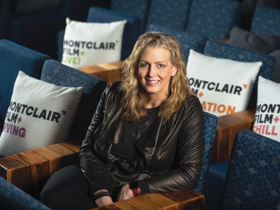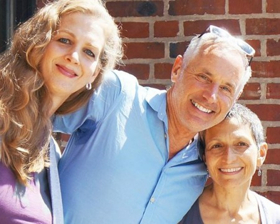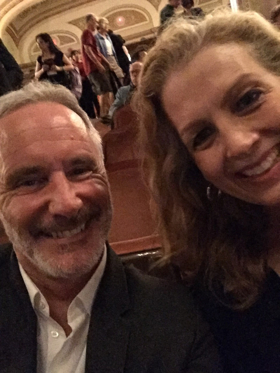Interview: Kim Reed Is Inspiration and Co-librettist of AS ONE at City Opera

"It's been quite a ride," says Kim Reed, co-librettist, filmmaker--and inspiration--for AS ONE, the chamber opera by Laura Kaminsky, with co-librettist Mark Campbell. The work's 27th production opened on May 30 under the auspices of New York City Opera, American Opera Projects (its original commissioner) and Kaufman Music Center at Merkin Hall on West 67 Street in Manhattan.
Reed was talking specifically about the five years since AS ONE--a chamber opera for two voices and string quartet--had its world premiere in Brooklyn, at BAM's Fisher Hall in September 2014. The work started out as an idea from composer Kaminsky, grew with the life experiences as a trans woman and filmmaking skills of Reed, and took form when Campbell came on board as librettist with Reed.
AS ONE has become a phenomenon. It is not only the most performed contemporary opera work in America and Canada but, in 2017, became more widely produced in the US than Puccini's TURANDOT or--hold on to your hat--Rossini's BARBIERE DI SIVIGLIA. "I don't think that any of us creators thought it would travel as much as it has," says Reed. "I've lost track of how many productions there have been, probably pushing thirty"--actually, City Opera's is the 27th production--"and it's really great and rewarding to see it find an audience."

with composer Laura Kaminsky.
The story traces the journey of its fictional protagonist, Hannah, from her small town origins, as paperboy, star quarterback and valedictorian not quite comfortable in her own skin, to college, close encounters and finally to Norway and the resolve (from the libretto) to "make myself happy. And the only way to do that is simple. And natural. No metaphors." As Campbell puts it, it is the "emergence of Hannah's true self--not replacing one person with another but becoming herself."
The story is touching, moving and utterly relatable. "It's a simple, universal human coming-of-age story, through the filter of a transgender person," Kaminsky told me last year. "What are the struggles, where are you rejected, where are you accepted? Everybody has to figure out who he or she is and how to be true to oneself. It was really important for us that it wouldn't just be thought of as 'the opera about the transgender person.'"
From Reed's side, she wanted to make it clear from the start she was fictionalizing and crafting a story based in part on her own experiences and "not trying to tell about the experiences of every trans person." (Campbell recalls that what attracted him to the project was that, in speaking to Reed, her account was "Something very specific and personal--and galvanizing.")
Adds Reed, "Much of the world thinks of 'transgender' as an 'issue,' with our dominant culture making presumptions about people and gender--dehumanizing people who are different. By telling a very specific story, I feel you get to know that person. That's the best way to make change," she explains.
I asked Reed whether she's excited or nervous about the opera being performed here. "I'm glad it's coming back," she says easily. "It's been battle tested and the people who are singing have done it before many times. I love the fact that the production is offering two casts (though I wish we could find the right trans cast to offer a third)."
Does seeing all these different casts spark some kind of reaction that was different from when you were first working on the piece, I ask her? "I don't think anything I've seen up there is completely foreign," she says. "I often see performers shading things in different ways that are revealing, finding a joke or enhancing a joke-timing with comedy is especially crucial and humor is central to Hannah's tale.

"And it's not just the performers but the different directors. We have this surreal fabrication, to have two sides of this person for 75-minutes or so, talking to herself, theatricalizing this interior monologue. I learn a lot from different directors and the way that they stage it. It sometimes is wonderful to be surprised at a director's identifying an element that you hadn't quite seen before."
But, for Reed, the new City Opera production is more than a homecoming to New York for the work (which was born at BAM in Brooklyn). After all, it's based on her story, about her journey to become the woman she is today.
"It's very personal--very much an autobiographical thing for me." How close, I ask? Does she remember all the time what it was like in those early days? "I think so--like any memory, sometimes things fade," she explains. "But I think that when you're experiencing a feeling of dislocation, that emotional resonance can become very memorable.
"It's the salient memories that remain, as opposed to the mundane stuff that tends to fade away with time. I think those memories are some of the sharpest and most distinct that I have. Because they really involve intense emotions.
"The best fiction taps into reality and the best nonfiction"--talking about her documentary filmmaking as well--"is not overwhelmed by reality and can find a sense of dramaturgy in it," she goes on. "Does an autobiographical piece have to be utterly literal in its interpretation of reality? I think you've gotta go looking for authenticity: How do you tell the story of me as a trans person?"
(Another way, predating AS ONE, was Reed's 2008 award-winning documentary, "Prodigal Sons," which told of her experiences returning to Montana for her 20th high school reunion, and seeing friends and family for the first time since her gender reassignment surgery.)
"But I think one of the major keys to its success was that Laura [composer Kaminsky] had never written an opera before and I had never written a libretto before. Maybe it was because we didn't understand the rules, weren't steeped in what those rules were, that we didn't know which rules we were breaking. I think that gave us a fresh approach in a lot of ways," she says.
"Of course, we had Mark, with his wealth of experience in storytelling, to help keep the narrative moving forward." Campbell has written more than a score of works, including the Pulitzer Prize winning SILENT NIGHT with Kevin Puts and this year's Grammy-winning opera, THE (R)EVOLUTION OF STEVE JOBS with Mason Bates.
"If we were encumbered by a very literal approach in telling my story--presenting a didactic way of how to understand what a trans person goes through--that could be a tedious thing," she avers. "But if you can create this fictional character who is rooted in nonfictional, autobiographical experience and give it three dimensions, that frees up other aspects of the storytelling--for example, having two sides of a person talking to each other.
"I've always been kind of charmed by this character Hannah and glad that she's charming others," she admits. The opera is written for a baritone and a mezzo, as Hannah Before and Hannah After, with the opera taking the form of a dialogue/monologue as the character develops. Reed recalls that, in developing the piece, many of the conversations that she had with her co-librettist Campbell had to do with maintaining the dialogue between the two sides of Hannah.
It's that freshness, along with the universality of certain themes, that has made the piece so resonant to a broad variety of audiences. So, clearly, that path was a smart one. It must have been gratifying--here was your first opera out of the gate and you hit the home run, I say. Did having such success with that first one raise your expectations that opera was not a foreign language to you? (She has, by the way, gone on to write other libretti, two with Campbell--SOME LIGHT EMERGES and TODAY IT RAINS--and POSTVILLE: HOMETOWN TO THE WORLD, all with scores by Kaminsky.)
"Yeah, but I didn't ever really feel like this was a foreign language"--she had listened to Met broadcasts at home in Montana when she was young--"because, coming from the world of film, which, like opera, grew out of theatre. Maybe I felt that I was getting to the roots of the art form but not a totally different art form.
"I think that my personal tastes within the film world have gravitated toward the same conciseness that's required to write a libretto," she explains. "It's that dependence on story, on character, on strong character leading the way: That's what drives me to opera and what drives me to writing-that's the common thread for me." (You'll also notice it in her latest documentary, "Dark Money," a political thriller that examines the influence of untraceable corporate money on our elections and elected officials. which can be seen on Amazon Prime Video.)
"Stories are stories; they work in many formats. Of course, you adjust them to the art form, but to me the backbone of it all is the narrative--and drawing on one's own experience can give you the emotional heft that I think audiences are yearning for, regardless of whether we're telling a tale with music or on film."
So, it's not necessarily the medium that's the message, as Marshall McLuhan would have had us believe. It's the message itself that holds the key. "I also love the fact that we've had a lot of audiences where half are people who love opera. but have never really considered the subject matter that we raise in AS ONE. And the other half of the audience," she continues, "are people who are members of the LGBTQ community and had never been to an opera before. So the fact that the piece is making inroads to new audiences is wonderful as well."
"In the last five years, there's been a trend towards better understanding nonbinary folks, gender nonconforming and gender fluidity in general. I think our formula, which is kind of based on the polarity of Hannah (i.e., Hannah Before and Hannah After) holds up.
"Even though we do have sort of a male side and sort of a female side, I think that the way we conceived the piece as being a sort of dialogue between those two poles still holds up and applies to people who are gender fluid, gender queer, or find themselves along the gender spectrum.
"Maybe if we were writing it new today, we would have accommodated the changing times a little bit more. (Maybe we'll talk in ten years and see things differently.) But I think that, the bottom line, is that whether people are trans or gender nonconforming, gender queer, etc., that the most important thing that you can do is to open up that conversation--and allow people who haven't had the conversation before to have it.
"To help them feel like that they cannot turn trans or gender nonconforming folk into that big 'other' over there that they don't understand and can't wrap their head around--but that, through this character, they find a place of empathy and hopefully sympathy. I think the piece has shown that, with the number of productions it has had, it can speak to those audiences."
New York City Opera's production of AS ONE will be performed May 30 at 8pm, June 1 at 9pm, June 4 at 8pm and June 6 at 8pm at Merkin Hall, 129 West 67th Street, New York, NY 10023 (between Broadway and Amsterdam), 212-501-3330. See City Opera's website.
Comments

Videos

